The unconscionable abandonment of rural America

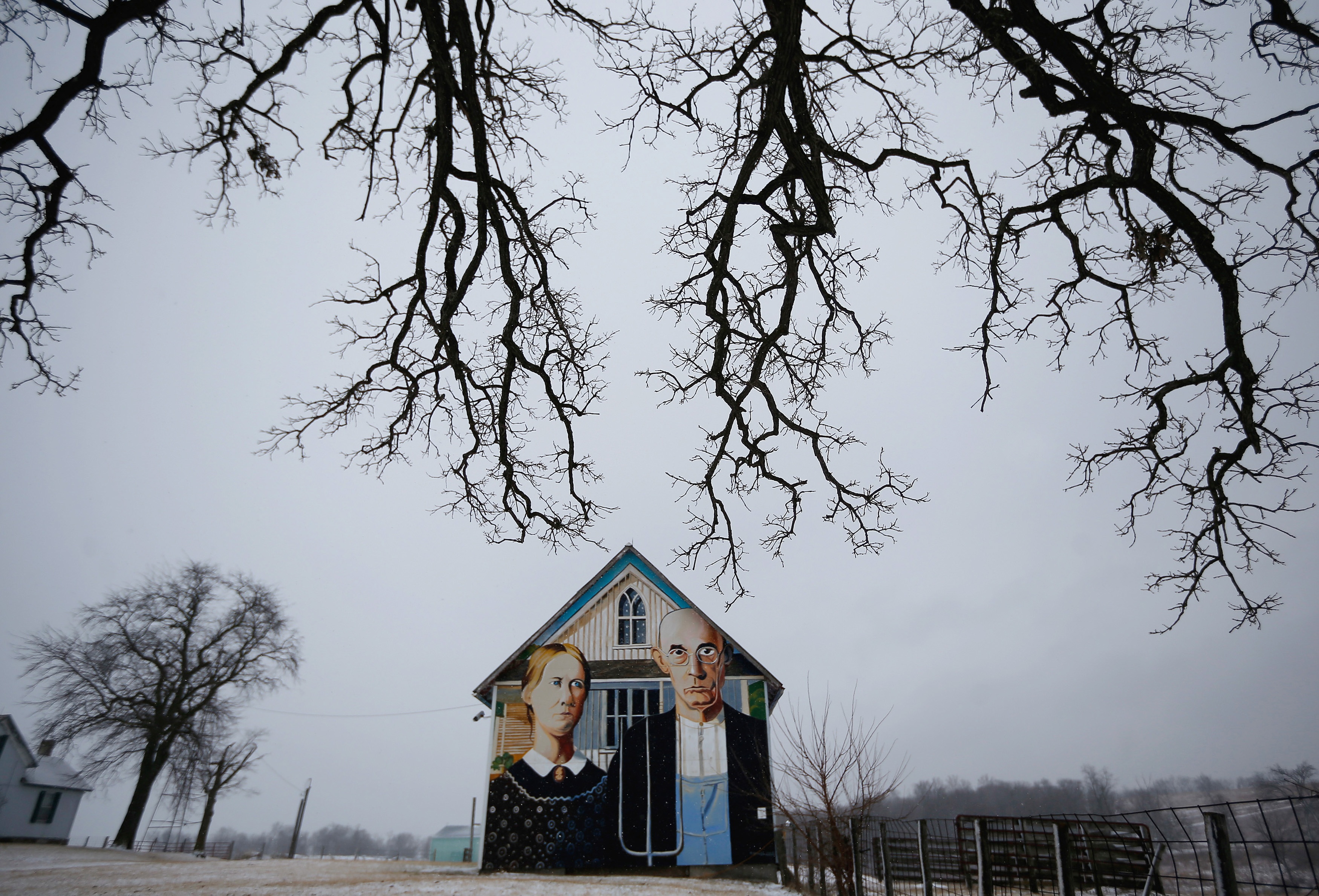
Americans who can barely keep their heads above water economically often blame housing. Costs are rising all over the country, and have skyrocketed in major coastal cities. One in four Americans use half their pay on housing, and even people quite high up the income ladder often live paycheck to paycheck as a result.
One potential solution: Reform housing regulations. San Francisco and New York have webs of zoning restrictions and historical preservation laws that make it difficult to build new housing supply. Demand then outpaces supply, and prices spike.
This sort of reform is a worthwhile idea. But it also assumes the cause of the problem, and thus the fix, is in America's sparkling coastal cities. It's not. Instead, we need to refocus on rural America.
The Week
Escape your echo chamber. Get the facts behind the news, plus analysis from multiple perspectives.

Sign up for The Week's Free Newsletters
From our morning news briefing to a weekly Good News Newsletter, get the best of The Week delivered directly to your inbox.
From our morning news briefing to a weekly Good News Newsletter, get the best of The Week delivered directly to your inbox.
Consider this study released last month by the Economic Innovation Group. Researchers looked at three of the last recoveries in the U.S. economy: 1992-1996, 2002-2006, and 2010-2014. They found an ominous and specifically geographic change: In the 1990s recovery, business and job creation was widespread across the country, with less dense and less populous counties of 500,000 people or less generating 71 percent of all new business establishments. In the 2010s, that figure plummeted to 19 percent. Instead, it was counties with more than 500,000 people generating 81 percent of new businesses. And the bulk of the change took place for counties with over a million people.
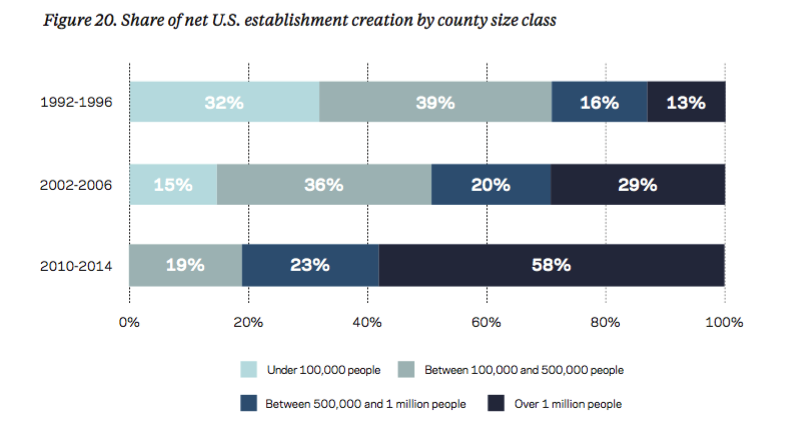
It's the same story for new jobs:
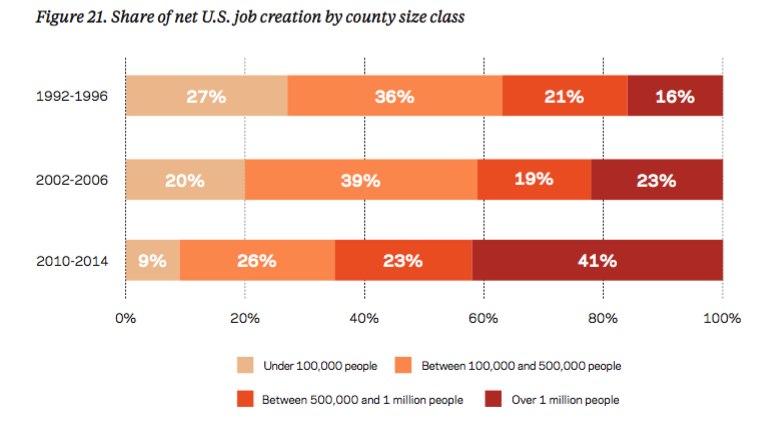
This might look like an argument for deregulating urban housing. If all the jobs and new businesses are being created in dense urban areas, shouldn't we make it as easy as possible to pile everyone into these places?
But the problem isn't just that dense counties and major cities account for way more of the country's economic vibrancy than they used to. It's that the total amount of economic activity has collapsed: In the 1990s and the 2000s recoveries, 420,850 and 400,390 new business establishments were created, respectively. But in the 2010s recovery following the Great Recession, that fell to 166,460.
A free daily email with the biggest news stories of the day – and the best features from TheWeek.com
Business creation didn't just move to the cities. It shrank — massively. Cities and dense counties were just the islands left over after the waters rose everywhere else.
You can see this in the business creation rates for counties of different densities:
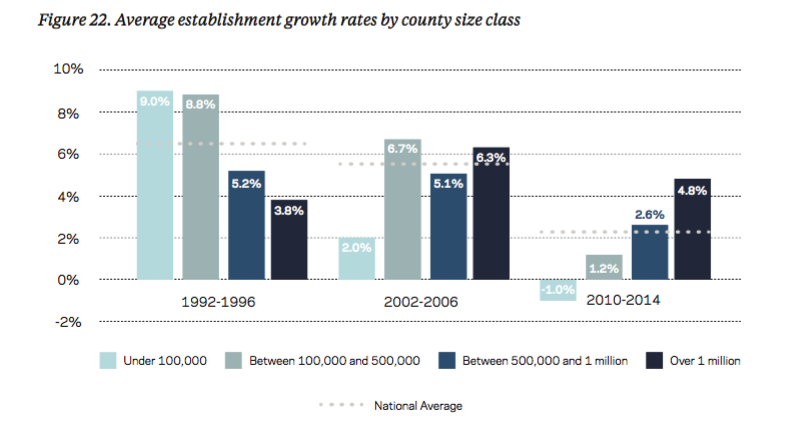
And for the rates of job creation for different county densities:
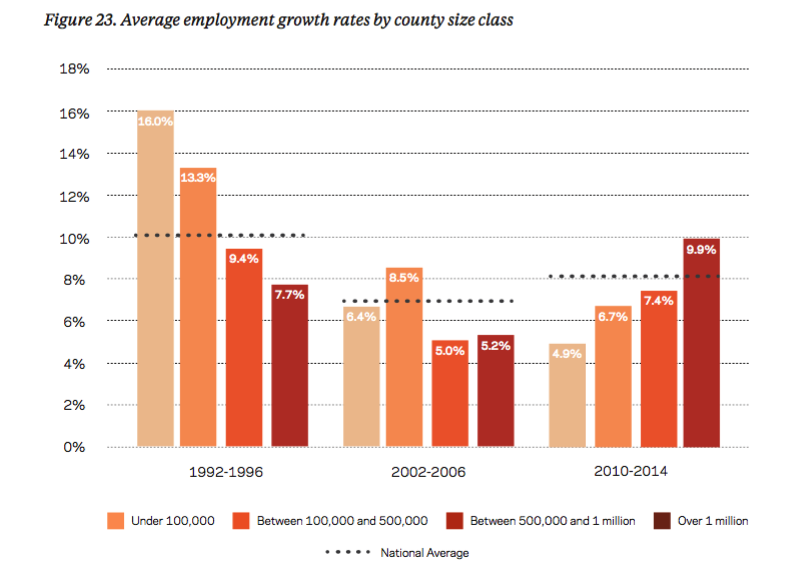
Counties with more than a million people did a bit better in the 2010s than they did in the 1990s. But not a lot better. By contrast, counties with less than 500,000 people have gone into a complete tailspin.
In the 1990s, just 17 percent of counties saw a net decline in business establishments. That number ballooned to 58 percent in the 2010s. Net job decline went from 14 percent of counties to 31 percent. Population decline spread from 22 percent of counties to 54 percent.
Rural communities are dying, economically and literally, and the rural Americans who can are fleeing to big cities. That means a massive shift in demand for housing towards the remaining economic safe harbors: cities.
So cities like San Francisco can and should increase their housing stock and populations faster. But it would be impossible for them to increase fast enough to actually stabilize or lower housing prices. Empty land is gone; they'd have to primarily rely on "infill" development: tearing down existing structures and replacing them with new ones. No human community could tolerate having its roads and buildings and infrastructure continuously ripped up at the necessary scope and pace.
But more importantly, we shouldn't just accept the economic death of rural America. We should try to reverse it.
Public sector employment plus public works and welfare aid are all major sources of jobs and demand for these communities. Federal budget cuts demanded by the congressional GOP gutted much of the federal funding that props up local and state government economic activity. The 2010s recovery is the first since at least the 1980s during which spending and hiring at all levels of government fell rather than rose.
Phillip Longman wrote an essential article last year on how the federal government's turn away from airline and railway regulation allowed these services to pull out of less profitable smaller towns and regions, isolating these communities from the country's economic vibrancy. Meanwhile, the federal government's downshift in antitrust enforcement, and its indulgence of corporations who profit via patent law and intellectual property rights, all allowed major corporations headquartered in rich and dense urban hubs to effectively economically strip-mine much of the rest of the country.
It's time to reverse these policies, which have actively harmed less dense regions of the country. Rural America is worth fighting for.
Jeff Spross was the economics and business correspondent at TheWeek.com. He was previously a reporter at ThinkProgress.
-
 The best dark romance books to gingerly embrace right now
The best dark romance books to gingerly embrace right nowThe Week Recommends Steamy romances with a dark twist are gaining popularity with readers
-
 The ocean is getting more acidic — and harming sharks’ teeth
The ocean is getting more acidic — and harming sharks’ teethUnder the Radar ‘There is a corrosion effect on sharks’ teeth,’ a study’s author said
-
 6 exquisite homes for skiers
6 exquisite homes for skiersFeature Featuring a Scandinavian-style retreat in Southern California and a Utah abode with a designated ski room
